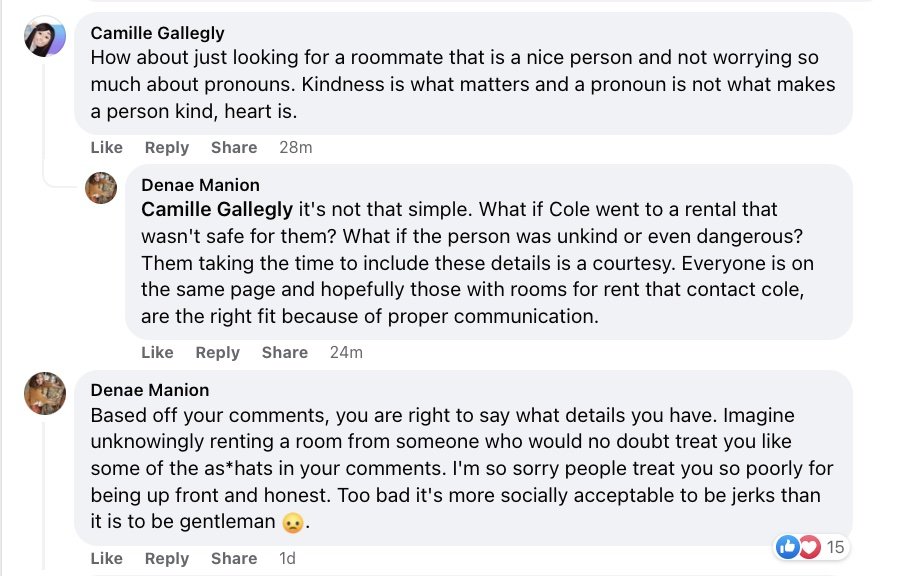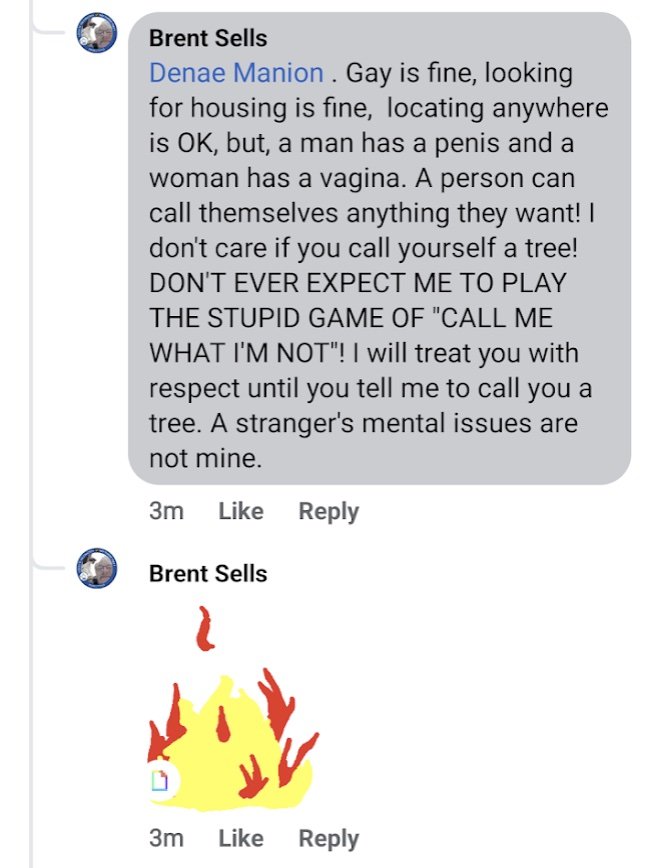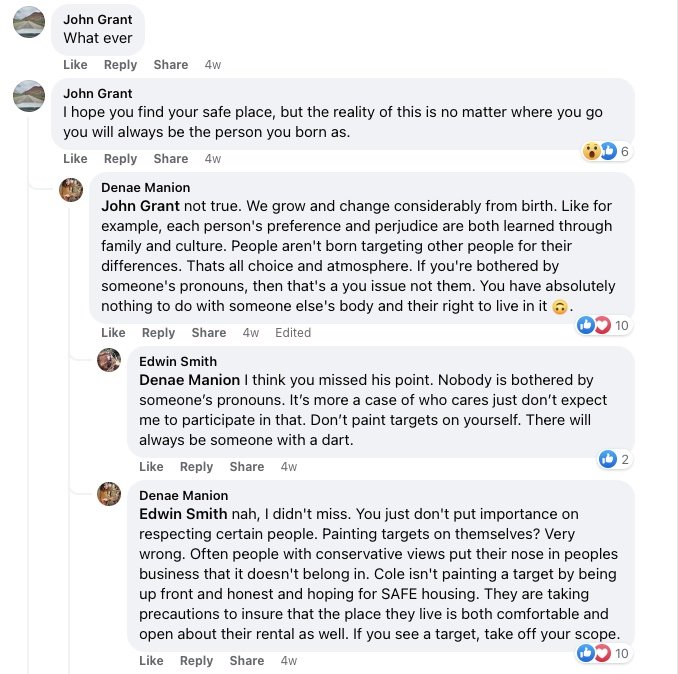Nonbinary Young Professional, Age 30, Seeks Room for Rent
One journalist's search for housing in the Columbia River Gorge reveals LGBTQ+ housing struggles in rural Oregon and Washington … and across the nation.
Cole Goodwin takes a selfie in the CCCNews office.
Column/Editorial Content
Content Warning: This article contains discussions of homophobia and transphobia.
By Cole Goodwin
Have you ever had one of those days that starts off bad and gets worse as it goes along?
Yeah?
Well this is how my week stacked up: my brother died, my girlfriend and I broke up, my Subaru blew a head gasket, and then to top it all off I had to start looking for new housing … in a sellers market.
I began looking for a home.
I took one glance online and my heart sank.
It became painfully clear my dream of owning a home in the Columbia River Gorge was pretty much impossible on a Journalist’s salary.
Everywhere I looked it was the same: low housing stock, high demand, and high prices.
In April, in White Salmon, WA there were 49 homes for sale with the median price tag of $832,000 and 1 rental available for $1,100 a month.
Hood River had 73 homes for sale, with the median price weighing in at $719,000 and just 4 rentals ranging from $1,500 to $2,700 a month.
In The Dalles there were 118 houses for sale with a median price of $400,000 and just 7 houses for rent, with rent prices that ranged from $950 to $4,200 a month.
Considering the average property in The Dalles was worth $204,400 in 2019, seeing the $400,000 price tag on the same properties just three years laters felt like a slap in the face.
A list of median home prices and available rentals in the Columbia River Gorge from Realtor.com.
After having exhausted my possibilities looking at surrounding communities like Dallesport, Mosier, Lyle, and Dufur, it became clear there was nothing within my price range that I could buy or rent for $600-$900 a month.
As someone who’s lived in the Columbia River Gorge most of my life, I have invested my time, money, and social capital in these communities. So, it stung to think that I couldn’t afford to buy a home in the landscape in which I grew up.
Also, suddenly statistics like this one started to make sense: A Stateline analysis of recent U.S. Census Bureau estimates shows rural areas lost 226,000 people, a decline of about .5%, between 2010 and 2020.
This is in part due to the housing crisis, and, in part, due to families realizing that while living in a small rural town can have its advantages, growing up in a rural area can also put youth at a higher risk of generational poverty, teen pregnancy, and substance abuse.
Why?
Because rural areas tend to have fewer formal and non-formal education opportunities, specialized schools and universities, lack high-speed internet, have few or no cultural activities, have small job markets, high unemployment rates among youth, lack access to specialized healthcare and have high rates of substance abuse due to depression, boredom, and the general feeling of malaise that accompanies having a lack of opportunities.
The thing is … even with all those downsides being known to me, I, like many other Americans, can’t really afford the cost of moving far away from my rural hometown either.
Most rentals require a plethora of fees upfront, including a security deposit, cleaning deposit, pet deposit, and first and last month's rent. So a $1,100 a month rental actually costs something closer to $3,700 upon first moving in.
The average take home pay of rural workers is much lower than in Urban areas.
Plus the average cost of moving to another apartment in your state without using a moving company is $985 for a moving truck, fuel, labor, and packing supplies. With a moving company that price becomes $2,500 and up. That means that many elderly and disabled folk who need to use moving companies often end up having much higher moving costs. And if you’ve got to move out of state you also have to pay additional costs of a new driver's license, car registration, new state health insurance and more.
Add that all up:
1st Month’s Rent $1,100
Last Month's Rent: $1,100
Security Deposit: $800
Pet Security Deposit: $500
Cleaning Deposit: $200
Moving Truck/Fuel/Packing Supplies/Personal Labor: $985
New Oregon Drivers License: $40
New Oregon Car Registration $126
= Total Moving Cost: $4,851
And you can see how those little hidden costs of housing and moving add up quickly. Throw in a plane ticket and a moving company for a long distance move and you might as well add an additional $3,000 on to the moving tab.
Unfortunately for many folks, housing and moving costs keep going up and minimum wage and median wage jobs haven’t kept up.
Maybe that’s part of why American residential mobility has been swiftly declining since 1985.
“In the past four decades, the proportion of Americans who are stuck in neighborhoods they no longer wish to live in grew by nearly 50%,” reads a new study authored by Nicholas Buttrick and Shigehiro Oishi. “Americans, it seems, are finding themselves increasingly locked into places that they wish to escape.”
From “The Cultural Dynamics of Declining Residential Mobility” by Nicholas Buttrick and Shigehiro Oishi.
The study argues that the residential stagnation is having a serious impact on American society.
According to Buttrick and Oishi, “mobile” societies value “individualism, optimism, and tolerance.” Whereas “stable” societies, with low levels of residential mobility, value “security, and a strong sense of the difference between ingroups and outgroups.” Stable societies have decreases, among its residents, in individualism, happiness, trust, optimism, and endorsement of the notion that hard work leads to success.
In other words, the study argues that as Americans have become more “stuck” in their communities of origin, the more they have begun to engage in group-think, and develop low tolerance for difference, which explains a lot about the increasingly oppositional and divisive state of American politics today.
And … maybe it’s also part of the reason finding an LGBTQ+ friendly room for rent in rural Oregon and Washington turned out to be an ordeal.
With Buttrick and Oishi’s study still on my mind, I began searching for a room to rent.
Honestly, I was pretty nervous about living with others.
I hadn't lived with many roommates since college, and I prefer having my own space. It’s nice not having to worry about someone else’s dishes or sharing a bathroom. But on top of all of that I’d recently come out as gender non-binary, and I didn’t want to live with someone I’d have to explain, justify, and defend my existence to everyday.
Just thinking about it made me feel anxious, angry, and depressed.
Plus, as much as I love the Gorge, it has a lot of work to do on its way to becoming an LGBTQ+-friendly place.
The beauty of the Columbia River Gorge’s rivers, mountains, and wildflowers really is undeniable. Photo Credit: Cole Goodwin
I certainly didn’t feel like it was safe for me to come out in elementary, middle, or high school in rural The Dalles, OR.
And when I did finally come out in 2019, as an adult, it was not an easy experience.
Many people were shocked that I was not “gender normal.” Including my boss at The Dalles Chamber of Commerce. She never once used my they/them pronouns while I worked for her, and went as far as to tell me she didn’t have to because it was not “the law.” (It wouldn’t become federally illegal for employers to harass or discriminate against someone based on gender identity or sexuality for another two years.) I tried looking for other jobs, but the prospect of having to fight to be respected at other local workplaces was frankly, pretty overwhelming.
And soon the situation began causing me such intense anxiety and depression that I had a full blown mental health crisis and had to leave work.
In addition, my mental health crisis drove a rift between me and my core support networks, leading to almost total isolation.
When I returned to work somewhat recovered weeks later, I was laid off.
To recap: within the span of a month of coming out in The Dalles, I lost my job, my support systems, and very nearly … my housing stability.
Despite my attempts to collect unemployment I never received a single check from the government.
Luckily, the Gorge queer community came to my rescue. They made sure I had food to eat, clothes to wear, community to connect with, and even helped me get a job at a transgender owned business in The Dalles.
So, now that you know my coming out story, maybe now you can see why I was feeling a bit daunted by the prospect of searching for a room for rent in an LGBTQ+ accepting home.
Still, housing is about survival and I would need to find a place to live if I was going to survive.
My friends and co-workers encouraged me to check the gorgenet classifieds and hang out in coffee shops. According to them — most of the housing that would suit me could only be discovered through word of mouth.
I shopped around, I checked the classifieds, I sent a dozen or so emails. I applied for rent assistance. I went and checked out a few places, but nothing quite fit.
Some folks told me they had never “really been around that stuff” when I told them I was nonbinary. Some said they were accepting … but then misgendered me the whole time during our interactions despite me offering up multiple corrections and explanations. One person asked if “everyone in the house would be required to use my pronouns.” Others just never returned my calls.
After a few weeks I was starting to lose hope that I’d find a place, so I made a facebook post on The Dalles Happenings.
And boy did the internet trolls of The Dalles have a field day.
The renter’s ad I posted on The Dalles Happenings on May 6th, 2022.
It took less than 24-hours for the trolls to rain down a hellstorm of hate upon me.
Comments ranged from attempts at dry irony, and invalidation, to outright transphobia. A few trolls went as far as to make comments that amounted to thinly veiled threats of violence. (Their comments were reported and removed and I didn’t manage to get screenshots of them.)
As the notifications rolled in my mind swam with headlines, I’d read about other LGBTQ+ folx going missing or being found dead.
I found my mind circling back to a statistic I’d heard recently that stated LGBTQ+ Americans are four times more likely than non-LGBT people to experience violent victimization, including rape, sexual assault, and aggravated or simple assault.
As you can see in the comments above, some nice souls tried to intervene in the comments on my behalf, but nothing really seemed to de-escalate the trolls. And while this transgender person appreciates those in our community that stand up to bullies, and bigots, experts say that it’s better to just ignore the online trolls and report them to page moderators.
What’s an internet troll? According to experts who weighed in on The psychology of trolling: what sort of person becomes a troll and why. Trolls are people who engage in “deceptive and disruptive online behaviour, which typically involves posting inflammatory and malicious comments to deliberately provoke or upset people.” Studies show that trolls are most often but not always men who score high on psychopathy (poor behavioral control, and lack of empathy), score high on cognitive empathy (understanding how they affect others emotions), and score low on affective empathy (not actually feeling others' pain).
Dr. Kalanit Ben-Ari told Stylist.co.uk that people engage in trolling behavior out of a craving for attention.
“Their comments often spark attention from others, so it can give the illusion of being important,” Ben-Ari told Stylist.co.uk. “And this sense of importance and centre of attention usually compensates for how they really feel in their life.”
That’s why Ben-Ari says you shouldn’t “feed” the trolls. Start giving one troll attention, and the other trolls tend to join the feeding fray as well.
“You should absolutely ignore them,” says Ben-Ari, “as any reaction will give them their needed attention or pleasure. But don’t suffer in silence: contact the site manager and let them know you’re being bullied. They can report, monitor extreme reactions, or force identification for comments.”
Some social media platforms like Ahwaa, a social media platform geared towards LGBTQ+ folx in the Middle East, have taken a different approach to addressing trolls by “gamifying” the experience, rewarding users with good behavior and demoting users with poor behavior.
“The community is self-insulating against bad actors,” Esra’a Al Shafei, founder of Ahwaa told ideas.TED.com. “Since its launch, no troll has had access to the more sensitive chat rooms and posts on those pages. That’s a credit to our community, as well as to the site’s design.”
But fast forward 93 reactions and 83 comments later, and despite Ben-Ari’s advice to ignore the trolls …I decided I just had to revise my post to address the trolls.
I spent hours formulating a deeply researched, educated response based on science and lived experience (click here to read) … to which no one responded.
Typical, I thought, I should have listened to Ben-Ari.
Overall, the whole experience of looking for housing as a genderfluid person was turning out to be a time consuming financial, logistical, mental, and emotional nightmare.
All of which was exacerbated by the fact that I was grieving my brother and my romantic relationship. Meanwhile daily human tasks like going to work, paying the bills, walking the dog, laundry, cooking, and eating etc. still had to get done.
But then a miracle happened: I found a place to live.
There was a house in Lyle, WA that had a room opening up in July.
They advertised themselves as a house full of active 30-somethings looking for the same.
It was in my price range at $600 a month with a $600 safety deposit. Plus it was on the Washington side of the Gorge where I was already living. So, I wouldn’t have to pay additional moving costs such as re-registering my car, getting a new driver's license, or switching healthcare providers.
The entranceway of my soon to be new home!!!
Hopeful, I went to check out the cute four bedroom house with a pellet stove. It turned out to be located just 15 minutes from Hood River and The Dalles bridges. And I was relieved to discover that unlike many of the places I’d looked, the basement didn’t seem haunted.
Plus, the room had a full sized closet, which could accommodate my expansive genderfluid wardrobe, two windows for my houseplant friends, and enough room for a queen sized bed.
Best of all the people already living there were kind and while not perfectly practiced in using they/them pronouns for nonbinary folk, seemed very accepting.
So, I told them I’d take it and I’m looking forward to moving house in July!
But while my story has a happy ending (for now anyway) not everyone’s does.
LGBTQ+ folx across the nation still struggle to find housing.
LGBTQ+ Americans can be denied the right to buy or rent a home based on their identity in 29 states.
In addition LGBTQ+ adults are 20% less likely to own a home than their straight peers. LGBTQ+ adults between the ages of 18-25 are also 2.2 times more likely to experience houselessness and 15% more likely to experience poverty then their straight peers.
Even more depressing is that LGBTQ+ youth are 120% more likely to experience homelessness then their straight peers and currently 40% of homeless youth in America identify as LGBTQ+.
The housing gap between LGBTQ+ people and heterosexual and cisgendered people is largely due to the fact many of the laws protecting LGBTQ people from discrimination are still pretty new. In fact the most recent one is less than a year old.
It may seem shocking to some but despite the fact that it has been illegal to discriminate against people based on sexual orientation in the realms of public employment, housing, and accommodations since the passage of the Oregon Equality Act in 2007 … it wasn’t until 2022 that a new law began barring real estate agents from discriminating against clients based on sexual orientation and gender identity.
However, despite the many challenges facing LGBTQ+ Americans today, there is still hope. The Equality Act was first introduced into the legislature in February of 2021, where it passed in the house and if it eventually passes into law it will help level the playing field for LGBTQ+ Americans in terms of employment and housing.
Join the Human Rights Campaign in supporting the Equality Act by clicking here.
Join the Human Rights Campaign in supporting the Equality Act by clicking here.











